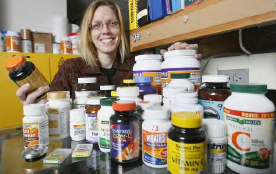
Lisa Mauer, Purdue University associate professor of food science
High humidity in the kitchen and bathroom could be degrading your vitamins and supplements stored there, even if the lids are on tight, a Purdue University study shows.
Lisa Mauer, an associate professor of food science, said that crystalline substances–including vitamin C, some vitamin B forms and other dietary supplements–are prone to a process called deliquescence, in which humidity causes a water-soluble solid to dissolve. Keeping those supplements away from warm, humid environments can help ensure their effectiveness.
Mauer’s findings were published in the online edition of the Journal of Agricultural and Food Chemistry.
“If you get some moisture present or ingredients dissolve, they’ll decrease the quality and shelf life of the product and decrease the nutrient delivery,” Mauer said. “You can get complete loss of the ingredients. It depends on the conditions. It depends on the formulations. Within a very short time–in a week–you can get complete loss of vitamin C in some products that have deliquesced.”
Mauer said opening and closing a jar of vitamins will change the atmosphere inside the jar. So if you’re opening it in the bathroom, you’ll add a bit of humidity and moisture each time. “The humidity in your kitchen or bathroom can cycle up quite high,” she said, “depending on how long of a shower you take, for example, and can get higher than 98 percent.”
Once humidity is decreased, the product will solidify, but by then, it’s too late. At that point, any chemical changes or degradation that have occurred will not reverse. “You don’t regain a vitamin C content after the product resolidifies or is moved to a lower humidity,” Mauer said. “The chemical changes we’ve observed are not reversible.”
Other than keeping an eye out for liquid in vitamin containers, Mauer advises consumers to look for brown spots, especially on children’s vitamins. She suggests discarding any dietary supplements that show signs of moisture damage or browning—noting that they’re not necessarily unsafe, just ineffective.